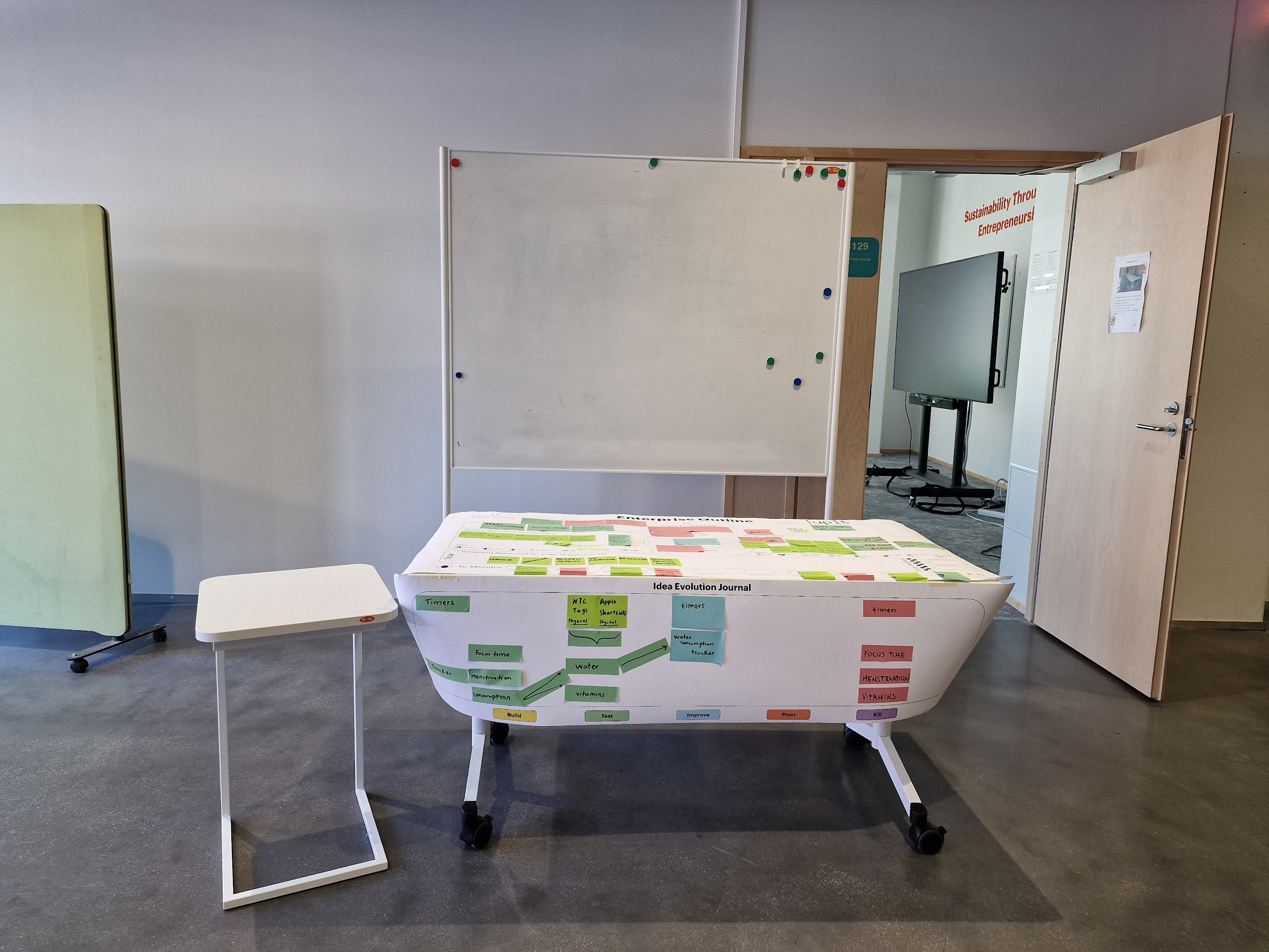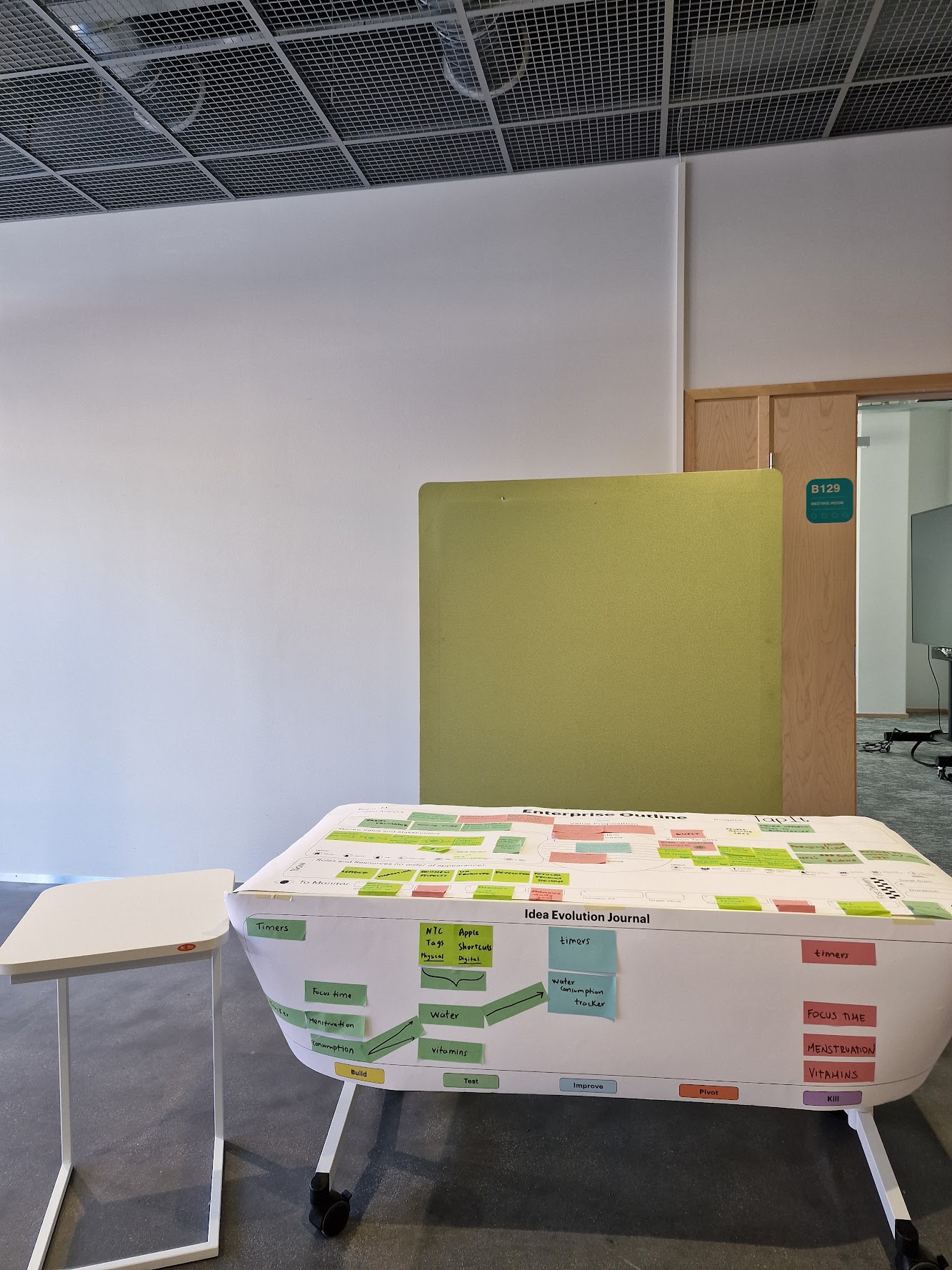TU-E4100 - Startup Experience D, Lecture, 9.1.2024-11.4.2024
This course space end date is set to 11.04.2024 Search Courses: TU-E4100
Översikt
-
-
One response per team. Please fill this in before Monday 8th April 23:00. We will start to set up Demo Day area starting from 10th April afternoon and 11th April morning from 9AM. Have a good plan and we can start to faciliate your set-ups accordingly.
Make sure to have enough time to set up your booths on April 10th and April 11th. The booths need to be finalized by 12:00 of April 11th.
This questionnaire is to help teams build and prepare their own booths for Demo Day. Teams can check if they need any further assistance in terms of presenting or booth arrangement. During Demo Day, you will be required to showcase your project in the best possible way, meaning you will need to consider how to present your prototype and deliver both visual and audio elements. Previously you have submitted your preliminary plan so now time to have the most up-to-date version of it.
Your booth will consist of a table with a canvas on top and the journal will attached to length of the table. You will have a wall or a whiteboard to hang your posters or decorate in any way that you think would benefit the team the most. You are also provided a podium to display your physical prototype. If you want to show something digitally, you will need to use your own tablets or laptops. Book them in advance (at least a few weeks) from Aalto takeout since these are always in short supply. Please be aware of the space limitations that we might experience in Garage due to having 16 teams in total.
Aalto Takeout link: https://takeout.aalto.fi/new/
A reminder on personal belonging: Do not keep personal items at the booths, all jackets to wardrobe and all personal items must be in bags kept in backstage.Picture examples of a booth for Demo Day, you may have a white board or a poster wall. Both can be used to be decorated any way you wish. And a podium will be placed next to your table for prototype. You can print out high quality poster at the print shop in Design Factory, using the prototyping budget.


-
During the session on teamwork with Jari and Satu, you have learnt how to facilitate a meeting and establish key principles for your own teamwork practices. As a team, summarize your takeaways and discussion in the format of a team agreement. This team agreement will serve as a binding contract and by submitting it, all team members have shown that they have agreed to this team agreement. These are the few questions that we would want you to use to set up the team agreement:
How will we facilitate discussions?
- How will we ensure that everyone has the opportunity to speak during discussions?
- What specific strategies will we use to actively engage all team members in conversations?
- What steps will we take to address conflicts within the team?
- How will we ensure that conflicts are resolved constructively and in a timely manner
- How will we prevent any one team member from dominating discussions?
- What measures will we put in place to encourage quieter members to participate?
- How will we distribute tasks and responsibilities to ensure everyone contributes equally?
- What actions will we take if a team member consistently fails to meet their commitments?
- What specific consequences or actions will we implement if team members do not adhere to the team agreement?
- How often will we review and revise our team agreement to adapt to changing circumstances?
- What tools and platforms will we use for team communication?
- How frequently will we update each other on our progress and challenges?
How will we support each other's growth?
- How can team members help each other develop new skills or knowledge related to the project?
- What opportunities for feedback and mentorship will we provide within the team?
How will we make decisions?
- What decision-making processes will we follow when faced with important choices or disagreements?
- How will we ensure that decisions are made collectively and fairly?
- How will we set and track deadlines for tasks and project milestones?
- What strategies will we use to manage our time effectively and avoid last-minute rushes?
- How will we recognize and celebrate our team's successes, no matter how small or large?
- What will be our approach to acknowledging and appreciating each other's contributions?
Due: 20th February 12:00. Format: PDF. No more than 3 pages. Name your file as (team number)-team agreement. -
What will happen:
- Teams will showcase what their initial idea is, using the Outline and demonstrated how much they have managed to validate using customer interviews and prototyping. Each team will have 1 minute to present:
- What is the problem the team is trying to solve?
- How did you validate the problem?
- What are the current conventions related to the problem?
- How do you plan to break the conventions?
You won't need to use any slide, use the Outline explicitly and the prototype evolution journal. Outline MUST be filled to completely even if there are a lot of guesses and assumption. It will show
- Course instructors and external guest(s) will give coaching advice regarding the direction and help the team clarify uncertainties.
Key requirements:
Check the Outline and Prototype Evolution Journal instructions attached below.- Outline be fulfilled completely before the 1st review
- Interviews and some validation have been done
- Tests conducted using prototyping methods
- Prototype journal updated
Upload two things by Feb 26th 21:00
A high resolution photo of the outline before the review.
A high resolution photo of the prototype journal evolution. -
What will happen:
- Teams will showcase their business model, value proposition and their prototype using the canvases. Each team will have three minutes to present briefly:
- Customer:
Who is your customer? What is their problem? Why is it a problem for
them and how much is it costing them in terms of cost, time and other
quantitative attributes?
- Solution:
What is your current solution? What is your current prototype and what
are you testing for? What have you managed to validate in terms of value
proposition?
- Business: What business model are you adopting? What market are you targetting? How will you enter the market?
- (New) What is your biggest obstacle right now?
You won't need to use any slide, use the Outline explicitly and the prototype evolution journal. Outline MUST be filled to completely even if there are a lot of guesses and assumption.
Key requirements:
Upload two things by March 12th 21:00- Outline be fulfilled completely before the mid review, must be updated from the previous version.
- Minimum at least one prototype has been built and tested
- Tests conducted using prototyping methods
- Prototype journal updated
A high resolution photo of the outline before the review. (in JPG or PNG)
A high resolution photo of the prototype journal evolution. (in JPG or PNG) - Customer:
Who is your customer? What is their problem? Why is it a problem for
them and how much is it costing them in terms of cost, time and other
quantitative attributes?
-
There is a template attached to this box (See below). Make sure to check it out before your work on the final report!!
Your documentation report is a vital part of showcasing your journey, progress, and the depth of your work. We want you to take pride in your process and provide as much detail as possible regarding every step you've taken since day one. This is not the time to be modest; it's the time to shine a light on your hard work and dedication.
Showcase Your Work:
- Provide a comprehensive overview of your project's evolution from its inception. Describe the steps you've taken to arrive at this point and explain the reasoning behind each decision.
- Give special attention to how you've substantiated all claims and statements made in your Wireframes. Highlight your validation processes, testing methods, and the insights gained from these tests.
Embrace the Details:
- While being thorough, aim to keep your documentation concise and focused. Share your insights and discoveries without unnecessary length.
- Use the following questions as a framework, but don't hesitate to dive deeper into your work, particularly your testing and validation efforts.
Key Questions to Address:
Topic Narrowing: Explain how you narrowed down your project topic to its current focus.
Testing and Insights: Describe the tests you conducted and what you learned from them. Share details on how users interacted with and tested your prototype, highlighting the insights they provided and what aspects of your project they validated.
Business Model: Define your project's business model. Explain the rationale behind adopting this particular model, including how it aligns with your project's goals. Identify key stakeholders and describe your interactions with them.
Data Collection and Validation: Elaborate on how you collected data and validated your assumptions throughout the project.
Market Entry Strategy: Provide a clear plan on how you intend to enter the markets based on the claims made in your wireframe.
Scientific Approach: Demonstrate your commitment to a scientific approach in validating and building your solution.
Remember, your documentation report is an opportunity to showcase the depth and dedication you've poured into your project. Be proud of your journey and let your work shine through your report.
Format: Please make sure that your Report is a written report and not a video or a PowerPoint reading deck. You can include images, videos, graphs, graphics into the written report to make your case and showcase your work. Be creative and tell us your story, the one that we did not get to see from the surface!
Due date: 17th April 21:00
-
